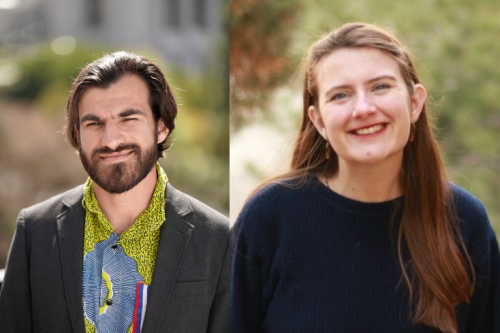ENV graduate students Sienna White and Mohit Dubey were selected to receive the DOE Computational Science Graduate Fellowship from the Krell Institute. As Krell Fellows, they will receive up to 4 years of funding to support their Ph.D. research, plus spend a summer doing research at a DOE national lab. They were selected to join a group of about 30 fellows selected through a national competition.
The increasing frequency and intensity of wildfires throughout the United States demonstrate a pressing need for reliable wildfire smoke forecasting tools. Numerical models simulating wildfire smoke transport can support real-time decision-making during wildfire events and provide detailed historical exposure estimates for health studies. Modeling wildfire smoke, however, is a difficult exercise, and errors in turbulence, plume rise, injection height, etc., all contribute to overall model error.
White's research will focus on utilizing data assimilation techniques to combine model results, satellite measurements, and air sensor network data in order to improve wildfire smoke model forecasts by providing a "best guess" estimate of wildfire smoke, given all available data. These model forecasts will then be leveraged in health studies to help identify place-based mitigation strategies in order to reduce the effects of wildfire smoke on vulnerable communities.
Throughout the course of my Ph.D., I also hope to work on improving the operational forecasting abilities of wildfire smoke models, resulting in better real-time forecasts for air quality agencies and impacted communities," said White. "I graduated from Stanford in 2019 with a BS in environmental engineering, and afterward spent a year in the Netherlands as a NAF-Fulbright Fellow at TU Delft doing river-morphology-related research. I then spent two years here in the Bay Area working as an environmental analyst at the San Francisco Estuary Institute. My work at SFEI focused on applying hydrodynamics and biogeochemical models to investigate nutrient delivery and transport within San Francisco Bay."
"Now, I'm excited to be broadening my interests beyond the world of water to weather prediction and air quality. After my Ph.D., I hope to work as a research scientist at a government agency or national lab. I'm very grateful to my PI, Professor Tina Chow, for supporting my research interests and to DOE Krell for this opportunity!"
Mohit Dubey is an Environmental Engineering M.S./Ph.D. student at UC Berkeley, where his research focuses on quantifying methane emissions using novel sensors and modeling techniques. Currently, Dubey is working with Dr. Sebastien Biraud (Lawrence Berkeley National Laboratory) and Dr. Fotini Chow (UC Berkeley) to develop a novel dispersion model to quantify methane leaks as part of the Undocumented Orphan Wells program.
This code will be further developed and refined using data collected from experiments performed at LBL and validated with field measurements in Bakersfield, CA. Alongside this plume dispersion model, Dubey is also working on the development of a novel solar-tracking spectrometer in collaboration with Butterfly Photonics to measure column-integrated methane. These results will then be used alongside WRF-STILT source inversion models to estimate sources of methane in the Bay Area and beyond.
The DOE Computational Science Graduate Fellowship is a highly competitive program that supports graduate students pursuing doctoral degrees in computational science and related fields. The program has supported over 450 students since its inception in 1991, many of whom have become leading researchers and educators in their fields.

